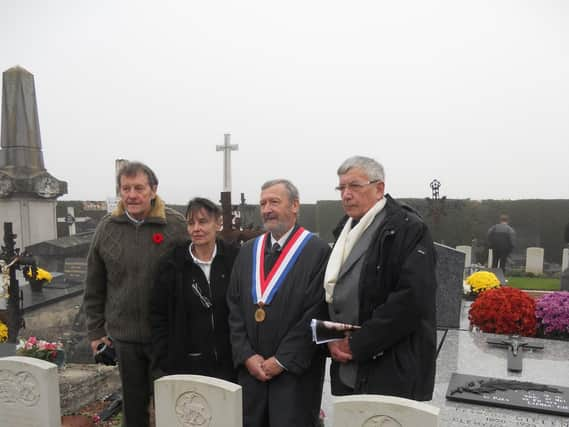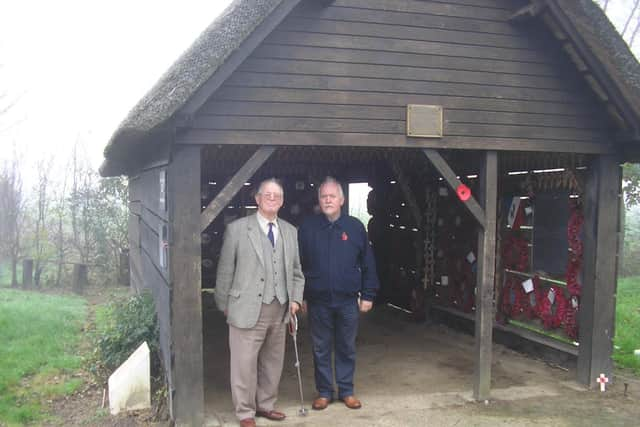Hero Rugby soldier who dived on a grenade to save his men from an SS massacre remembered


Whenever I reflect on the poet Rupert Brooke’s immortal lines about foreign fields, I invariably think of a Second World War Rugby soldier who sacrificed his life in an act of almost unimaginable courage.
More than 80 years have now elapsed since the event which claimed this man’s life. However, this soldier was no ordinary casualty of battle.
Advertisement
Hide AdAdvertisement
Hide AdIn 2005, the daughter of Sergeant Major Augustus Jennings visited her home town and discovered that her father’s name was not on the Rugby war memorial. This omission has now been rectified.


And in September this year, a full set of campaign medals was presented at the Fusiliers Museum in Warwick to the family of the war hero who sacrificed his life in an attempt to save his comrades.
But I can now shed further light on the reason why Sergeant Major Jennings, of the Royal Warwickshire Regiment, died during the retreat to Dunkirk, France, in 1940.
Faced with overwhelming odds in the late spring of that year, the British Army was in full retreat to the coast when a number of regiments were ordered to make a last-ditch stand to hold up the Germans’ advance.
Advertisement
Hide AdAdvertisement
Hide AdThe men were told that they were to fight until their ammunition ran out.
Among these soldiers were members of the 2 nd Royal Warwickshire. The county men were being sacrificed to enable their comrades in other regiments to escape.
Earlier that day, an enemy staff car had been shot up by British soldiers.
But what they could not know was that one of the surviving Germans in that gun battle was Obergruppenfuhrer Josef ‘Sepp’ Dietrich, commanding officer of the notorious Leibstandarte Adolf Hitler Regiment of the Waffen SS.
Advertisement
Hide AdAdvertisement
Hide AdThe Germans therefore wanted revenge for what had happened to their officer. And it was to be the Warwicks who would pay the price…
The Waffen SS already had a reputation for not taking prisoners. And it was this that would later seal the fates of nearly 100 captured Warwickshire soldiers, soon to be murdered in cold blood by Germans enraged at what had happened to their commanding officer.
After hours of desperate fighting and with no ammunition left, the
Warwicks surrendered. And then the full horror started to unfold.
Advertisement
Hide AdAdvertisement
Hide AdThe survivors were herded into a tiny barn on the outskirts of Wormhoudt, near Calais, and taken out in groups of five and shot.
After a while, the Germans decided this method of execution was too laborious, and began to throw grenades into the barn. This killed a number of the soldiers, including Captain Charles Orton .
But the grenades failed to kill them all, and this was because of the bravery of Sergeant Major Jennings and Sergeant Stanley Moore, who hurled themselves on top of the grenades, using their bodies to shieldtheir comrades from the blasts. They died instantly.
As the Germans started to indiscriminately shoot the survivors, a Warwickshire officer – Captain Lynn-Allen – managed to escape from the barn with a private, Alf Tombs.
Advertisement
Hide AdAdvertisement
Hide AdThey attempted to hide behind reeds in a pond but were discovered and shot. Lynn-Allen was killed but Tombs, despite a massive loss of blood, managed to survive and later reached British lines.
Nearly all the men in the barn were killed, with only a few getting away and later giving evidence to a war crimes tribunal after the war.
In 2013, I spoke on the phone to Sergeant Major Jennings’ daughter, Diane Jennings-Norton, of Yelverton, Devon. At the time, I was the press officer for a battlefields research group, which was due to visit the massacre site at Wormhoudt.
She told me that she believed his name was originally left off because the Army kept details of his death secret. Mrs Jennings-Norton said her family didn’t know the circumstances of the atrocity until 1988.
Advertisement
Hide AdAdvertisement
Hide AdShe understood that this was part of the 70-year secrecy order, and was still under wraps, not due to be released until 2022. But the facts started to emerge in the 1980s because Jeff Rooker, who was then MP for Perry Barr, Birmingham, had one of the survivors in his constituency, and he wanted the story to be made public.
After the story came to light, Sergeant Major Jennings’ name was eventually added to the Rugby memorial in 2013.
A few years ago, I visited the barn at Wormhoudt, and attended a remembrance service for the murdered men, accompanied by a son of one of the soldiers, Thomas White, of Warwick.
Later, we travelled to the cemetery where many of the soldiers were buried, together with the town mayor. I’ll never forget his moving address and the tributes he paid, speaking of the ‘English martyrs’ who had fought and died so bravely trying to save his country from invaders.
Advertisement
Hide AdAdvertisement
Hide AdAs I left the cemetery, the words of Rupert Brooke’s poem The Soldier started running through my head. If I should die, think only this of me, that there’s some corner of a foreign field that is for ever England… Yes indeed. And I think that Rugby’s celebrated poet could have written no finer epitaph for Augustus Jennings.
John Phillpott’s memoir of his days on the Rugby Advertiser titled Go and Make the Tea, Boy! is published by Brewin Books and now on sale.